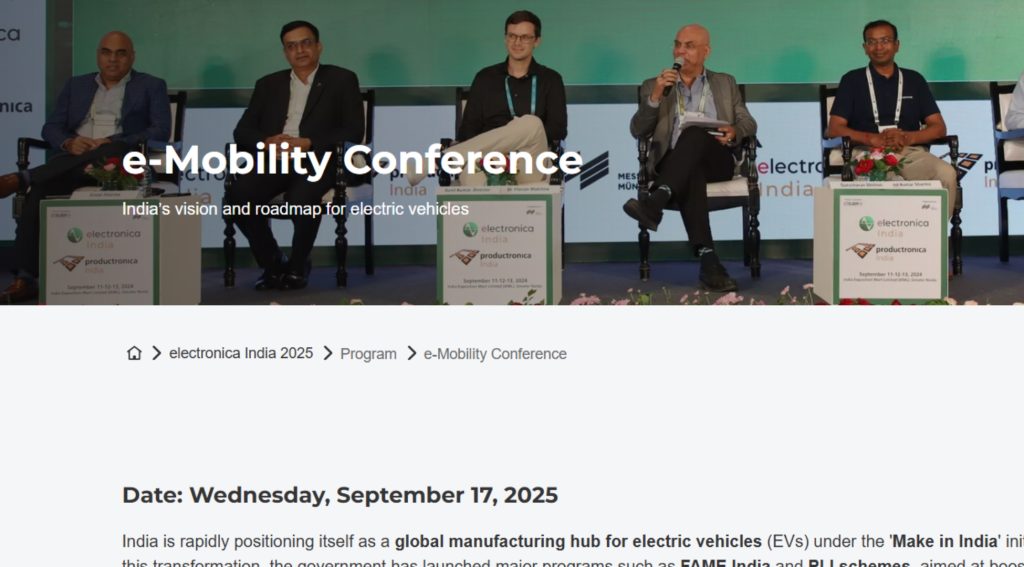India’s e-mobility sector is accelerating rapidly, with electric vehicle (EV) sales soaring 34% year-over-year in Q2 2025 to over 530,000 units—driven by policy incentives and surging consumer demand.
At the heart of this growth is the semiconductor market, projected to reach $45 billion–$50 billion in 2025 and grow over two-fold to $100 billion–$110 billion by 2030, as each EV now incorporates nearly two to three times more chips than a conventional ICE vehicle.
This backdrop makes the strategic role of semiconductors in EVs nothing less than transformative—and fraught with consequences for India’s economic and technological ambitions.
Data-driven context:
India is currently the world’s second-largest consumer of semiconductors, with demand rising sharply from $38 billion in 2023 to an estimated $50 billion in 2025, largely on the back of e-mobility, smartphones, and industrial electronics.
The EV sector itself is forecast to touch $113.99 billion by 2029, reflecting massive growth opportunities for smart EV hardware.
Each electric vehicle typically requires 2–3 times more chips than legacy vehicles—chips that power battery management, advanced driver assistance systems (ADAS), infotainment, and autonomous capabilities.
Major semiconductor challenges for EVs:
Several acute challenges threaten India’s ambitions to localize and secure its EV semiconductor supply chain:
Supply Chain Fragility: Heavy reliance on imports from Taiwan, China, and South Korea for raw materials, wafers, and components exposes the industry to disruptions and delays.
Raw Material Constraints: Limited availability of semiconductor-grade silicon wafers, gases, and specialty chemicals complicates chip manufacturing domestically.
Manufacturing Ecosystem: India has a nascent chip fabrication (fab) ecosystem, with only a handful of commercial grade fabs, leading to bottlenecks in scaling up production and innovation.
Geopolitical Vulnerabilities: Global tensions and trade restrictions further threaten access and security of semiconductor supplies for automotive electronics.
Skilled Talent Shortage: The industry faces shortages in specialized manufacturing talent required for advanced chip production and system integration.

In response to these market realities, WriteCanvas, the knowledge partner for the e-mobility conference on the inaugural day of Electronica Productonica 2025 at BIEC Bangalore, decided to anchor the conference around “Silicon to Mobility: EVs’ Quantum Leap.”
Sanjeev Gupta, CEO, Karnataka Digital Economy Mission will inaugurate the e-mobility conference.
Three high-impact panel discussions will drive sectoral insights:
Customization vs. Standardization: Exploring semiconductor strategies as EV manufacturers balance bespoke chip solutions with standardized cost-effective platforms for mass market scaling.
Eminent Speakers: Shailendra Shukla, MD, Mobility Group, Eaton, Ruchir Dixit, Vice President & Country Manager, Siemens EDA, Morgana De Avila Ribas, PhD, Sr. General Manager – R&D, Electronics, 3M India Ltd, Gnana Kumara Swamy, Managing Director, India, requisimus
The Software-Defined Vehicle: Dissecting how smart chips and next-gen battery systems are redefining vehicle intelligence, user experience, and safety.
Eminent Speakers: Chakrapani PV, Director, Techsol Energies, Himanshu Garg, Compiler software engineer, Ola Krutrim, Niranjan Jeyapandian, Director – Electrification, xEVs/HEVs and eMobility Cloud Car Practice, Wipro Engg. – GBL, Dr Saikat Das Gupta, Senior VP (Chief Scientist), HASTERI (Hari Shankar Singhania Elastomer & Tyre Research); and Manish Sharma, Head – Systems & Solutions Engineering, L&T Semiconductor Technologies.
Geopolitical Security & Supply Chains: Addressing risks, opportunities, and new calculus in global semiconductor sourcing, security, and localization.
Eminent Speakers: Ashwin Verma, COO, Ohmium Green Hydrogen, Kasturi Gomatham, Global Product Head, Shell
e-Mobility, Vijay Mathew, Director, Industrial Technologies, Frost & Sullivan, Devraj Rajagopal, Sr. Director, Engineering, Renesas; Santhosh K M, Managing Director, India, SemiCon Fab Technologies, Sonam Motwani, CEO, Karkhana io.
Additionally, Dr. Guru Prasad A S, Head of the CoE Edge & Connectivity at the CTO office, Bosch Global Software Technologies, will conduct a specialized ADAS Perception workshop, offering an interactive walkthrough focused on advanced safety and autonomy systems—underscoring the market’s drive for smart mobility solutions.
The strategic value:
Participation in this conference provides critical exposure to the future of Indian e-mobility, access to sector leaders, innovators, and policymakers, and direct engagement with the technical, policy, and commercial forces shaping EV and semiconductor markets. Attendees will gain actionable insights for navigating supply chain risks, leveraging semiconductor innovations, and partnering for India’s green mobility transition—positioning themselves at the center of a sector set to redefine transportation and technology in India and beyond.












